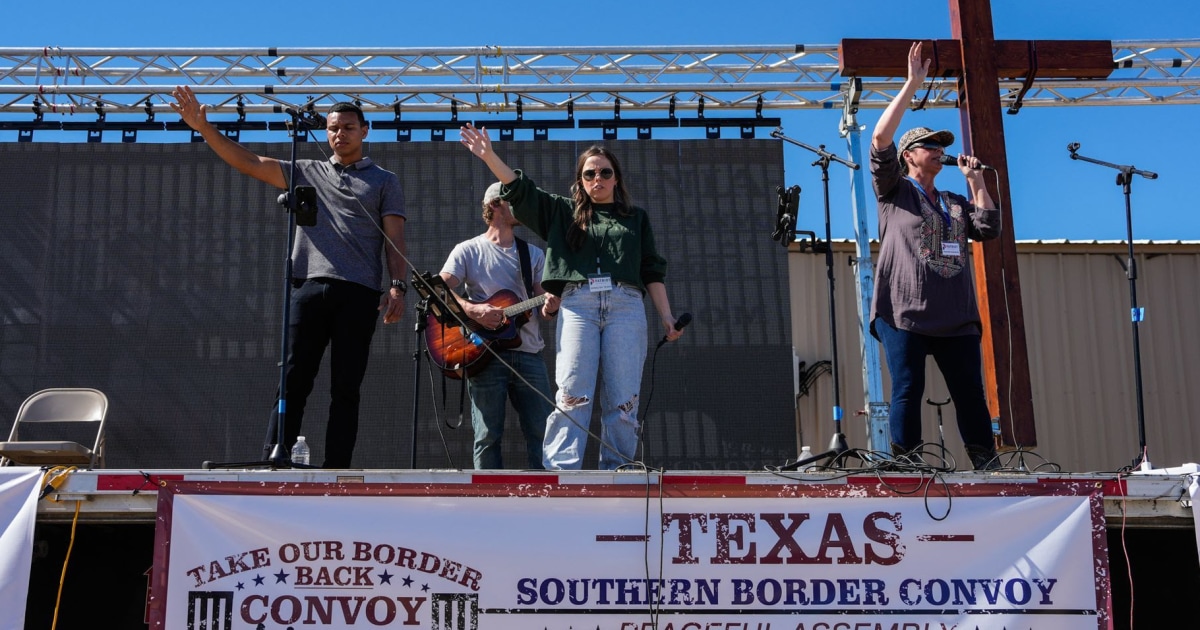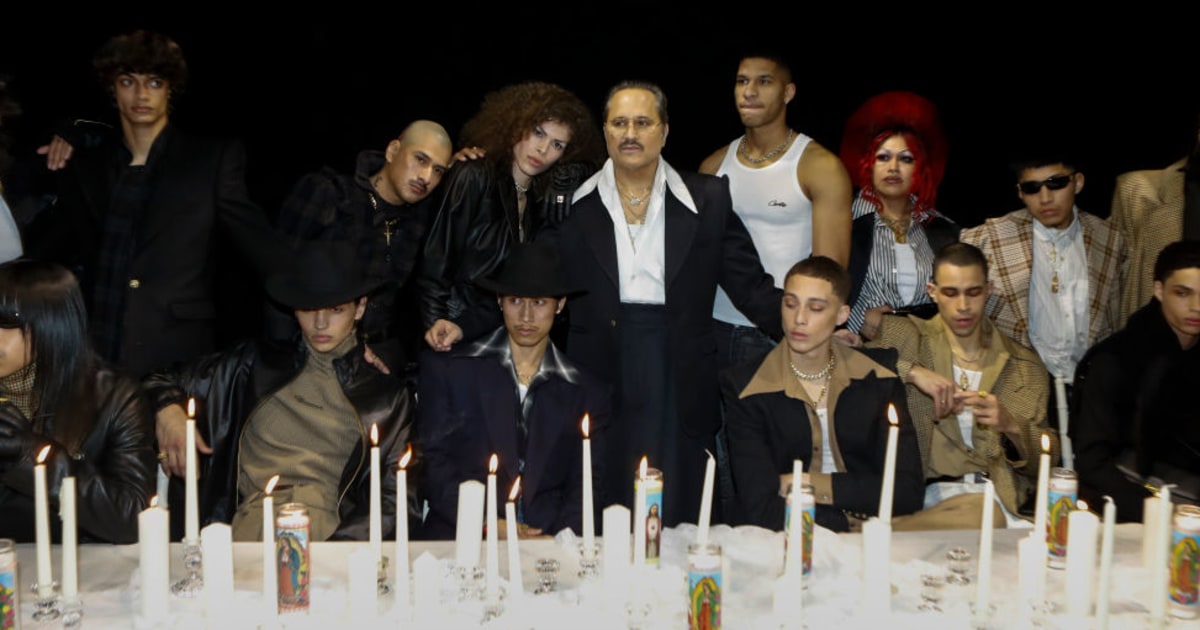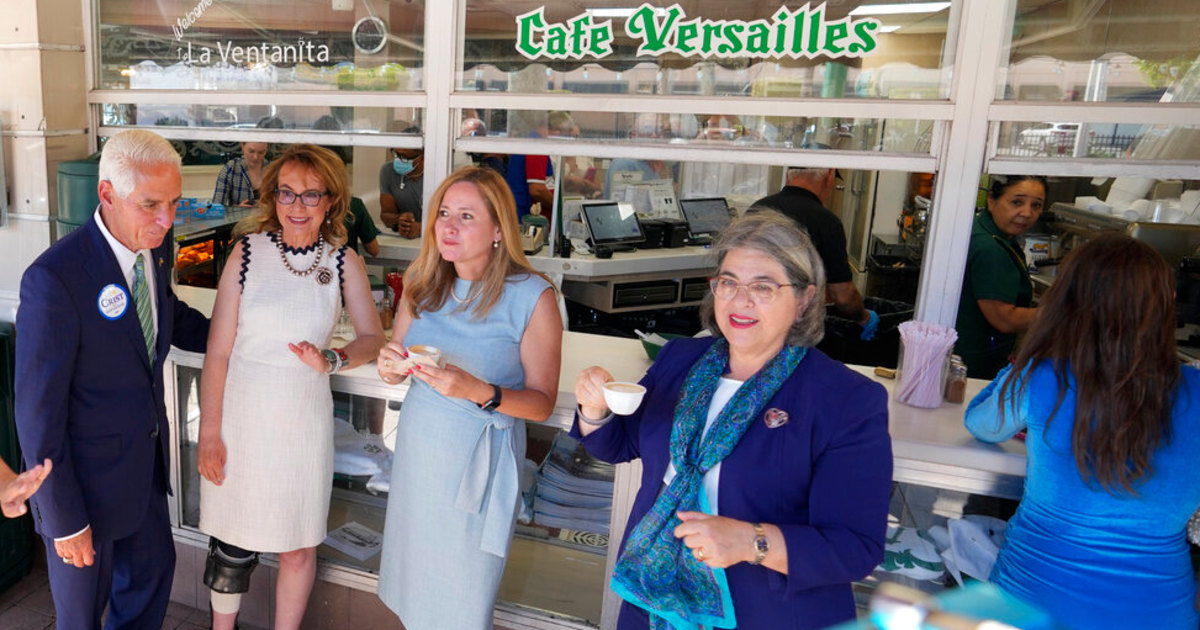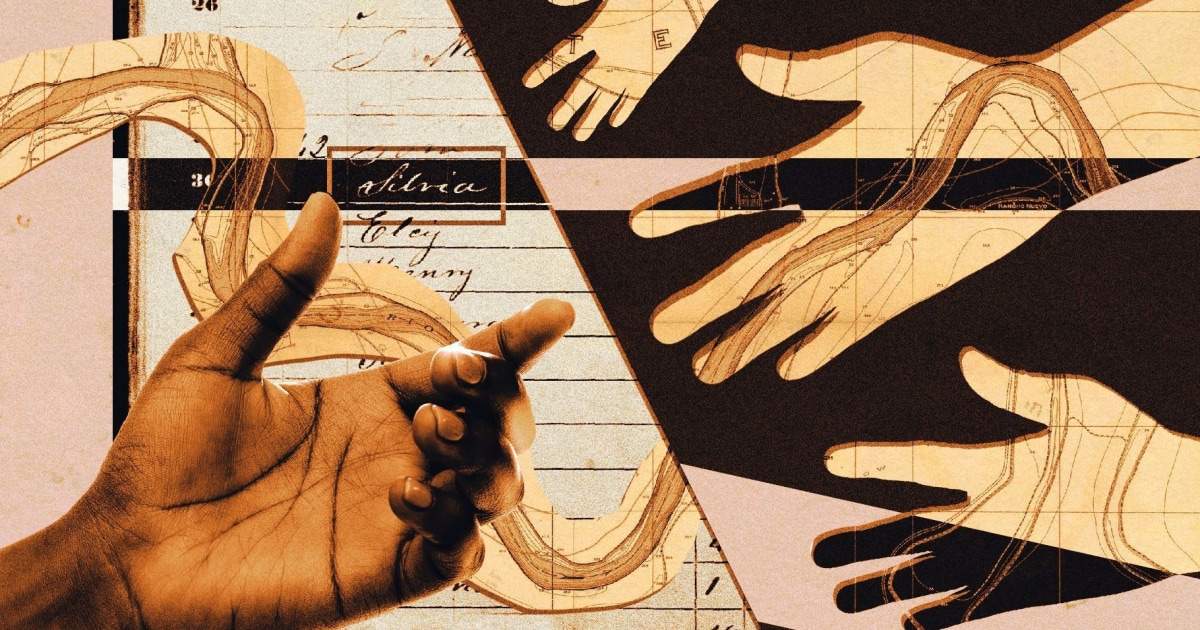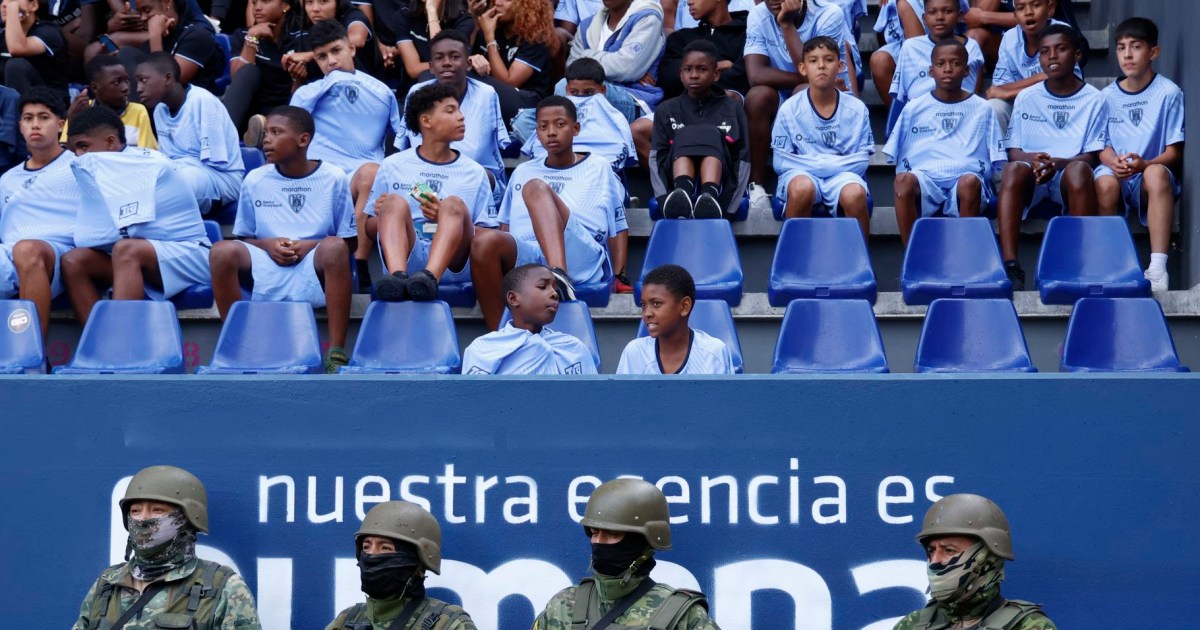By Marina E. Franco and Russell Contreras
Welcome to Axios Latino
, a newsletter designed to tell you every Thursday the stories that have a special impact on the Latino communities in the United States and in Latin America.
If you are interested in subscribing (in English), you can do so by clicking here.
Every week we will publish it here on Noticias Telemundo also in Spanish for those who prefer to receive their news this way.
1 Big Topic: Police Brutality Shakes Mexico
As the US continues to debate the issue of police abuse in the trial of former officer Derek Chauvin, in Mexico a case similar to George Floyd's has forced a discussion.
Police officers broke a woman's neck when they were detaining her.
Why it matters:
Victoria Salazar was forced to the ground last Sunday by officials from the Tulum tourist area, and police officers kept her face down against the pavement even as she screamed.
The motives for the attempted arrest of Salazar have not been clarified.
In short:
The death of Salazar, a Salvadoran refugee who has lived in Tulum for years, is the most recent case of Mexican authorities charged with the murder of someone originally from Central America.
A dozen police officers near the US-Mexico border.
they were arrested in February for their apparent participation in the massacre of 19 cremated migrants in Tamaulipas.
Guatemalan Elvin Mazariegos was shot near Mexico's border with Guatemala on Monday.
The Mexican armed forces have only said that it was a "wrong reaction" on the part of soldiers.
The general situation:
For years, Mexican law enforcement agencies have been accused of excessive use of force, of torturing people to force them to say that they are guilty without being guilty, and of physically and sexually abusing women who are detained many times. for no legitimate reason.
Victoria Salazar and her daughters suffered sexist violence before she died in police custody in Mexico, according to authorities
April 1, 202101: 34
In his words:
"The authorities are supposed to protect us [...] and the Mexican State should take responsibility as a State, because this was a case similar to what happened in the United States with [George] Floyd," said Rosibel Arriaza, the Salazar's mother and who obtained a humanitarian visa to pick up the body.
What's next:
Authorities in Quintana Roo, the state where Tulum is located, are investigating what happened to Salazar as a homicide.
Salvadoran President Nayib Bukele is demanding that "the full weight of the law" be applied against responsible officials.
Salazar's ex-partner was also arrested this week, since she, before dying, had accused him of sexually abusing her and one of her two daughters.
2. Snapshots from Tulum
AP /
Women protest in San Salvador, El Salvador, after the death of Victoria Salazar at the hands of the Mexican police, on March 29, 2021. REUTERS / Jose Cabezas
Above: A protester in Mexico City graffiti a police fence during a protest against the death of Victoria Salazar on March 29. Below: Women ask for “not one less migrant” during a demonstration in San Salvador after Salazar's death on March 29.
3. Half of Tenants Expect Eviction Relief
About 56% of Latinos or Hispanics who rent their home said in March, before a moratorium on evictions was extended, that they see very likely or likely to have to leave their home in the next two months due to possible non-payment, according to with Census data.
Tenants protest evictions in Massachusetts in October 2020.AP
Why it matters:
Evictions contribute to the spread of COVID-19, according to studies, as homeless people often end up in crowded situations, such as shelters.
The coronavirus itself spreads more easily among Latino families because they usually live with many people and in multigenerational households.
Black and Hispanic households
are twice as likely to have late rent or mortgage payments as white households are likely to be late, according to a report from the Consumer Financial Protection Bureau.
The CDC's extension of the eviction order
until June may then help Latino tenants or homeowners, although activists warn that the process is not automatic (you have to fill out papers to request relief) and that landlords still have options. to expel people.
4. Chile's new Constitution faces obstacles (again)
The Chilean government argued that
the pandemic requires postponing the vote of the constituents, civilians who will be in charge of drafting the new constitution of the South American country, which people have been asking for since at least the end of 2019.
[Militarization in Latin America in times of COVID-19]
Why it matters:
Chile continues to be governed by the same constitution in force since the 1980s, during the dictatorship of Augusto Pinochet, so many regret that the founding text does not have mechanisms to promote changes against social and economic inequalities.
Postponing the election of the 155 members of the future constituent assembly, which was moved from April 11 to May 16 after an increase in COVID-19 infections, will in turn delay a new text from entering into force, possibly awakening more protests.
Although Peru and Ecuador say they will keep April 11 as the date of presidential elections despite the coronavirus.
Chileans celebrate in style the approval to change the Pinochet Constitution
Oct. 26, 202001: 03
5. A possibility of forgiven loans, for the benefit of Latino students
The Department of Education
has suspended the repayment of certain federal student loans in cases of default, while Democratic senators insist that the law for economic relief does provide the possibility of canceling many more cases of loans with a tax exemption.
Why it matters:
Latinos often have more trouble repaying their college debts, and in the current situation they face several more stress and anxiety before considering attempts to cover loans.
Many have had to drop classes to work, either to care for family members or because they cannot pay their tuition, and Latino, Black, Asian-American or Native American students say more than white students that they will no longer be able to graduate on time.
Some students have nowhere to live due to campus closures.
The numbers:
23% of Latino college graduates who had used loans to pay for their studies had fallen behind in their payments since before the pandemic, compared to just 6% of white students, according to data from the Reserve. Federal.
There are also estimates that 12 years
after graduation, on average, whites who had used loans had repaid 90% of the debt, while Latino students still owed 80% of what they borrowed.
6. The secrets of coyotes
Up to $ 20,000 for crossing and bribes to 'la migra': several coyotes reveal details of their operations
March 31, 202103: 45
Two men working as coyotes on the border say $ 8,000 is enough to move people desperate enough to try to cross illegally across the desert.
But to cross migrants by car, in hiding, they charge up to $ 20,000 dollars because, according to the coyotes, the migra charges part to turn a blind eye.
In his words
:
Walking through the desert "is the most difficult way to get to the United States but the safest, because it is less guarded," says Orlando, one of the coyotes who spoke with Noticias Telemundo.
But to cross by car "many times we are told a time and the line to go, since sometimes it is arranged," he says.
In figures:
The "typical" journey through the desert moves along routes already designed to avoid the border wall, and can take from four hours to four days depending on the season of the year.
The Border Patrol
found 300 bodies in the last fiscal year of people who died trying to cross through the desert, usually from hypothermia or dehydration.
The number of unaccompanied minors
seeking to cross into the United States in search of safety or to reunite with family members could rise from 16,000 currently to 26,000 by September, according to forecasts in official documents that were leaked to Axios.
7. An opportunity for the women of El Salvador
Manuela is a Salvadoran who was sentenced to 30 years in prison after presenting an obstetric emergency and losing her baby.
She was reported to have an abortion and was handcuffed while she was still in the hospital.
They charged her with aggravated murder.
This week in San Salvador, rallies were held in favor of justice in his case.Marvin Recinos / AFP via Getty Images
The cases of two Salvadorans who were jailed for losing their babies, one of whom later died handcuffed to a hospital bed, could lead to a reform of the total ban on abortion in the Central American country.
Why it matters
:
The law in El Salvador is one of the most restrictive in the world and has long been criticized as a violation of human rights because many women are imprisoned even in cases of spontaneous abortions or if their babies are stillborn.
One of the cases before the Inter-American Court of Human Rights is that of Manuela, a 33-year-old mother of two who sought help when she bled during her third pregnancy and was sent straight to prison from the hospital.
About 159 women from El Salvador have been incarcerated under the anti-abortion law since 1998, according to UN data.
The general situation:
Latin America, especially Central America, has the most restrictive laws against abortion in the world.
And along with the Caribbean, it is also one of the areas with the worst preventable maternal mortality rates, in part due to the clandestine and unsafe interruptions of pregnancies.
8. A Latino advocacy group seeks to renew itself
The League of Latin American Citizens (LULAC) is the oldest Latino civil rights group in the US, but it is having to rethink as the people it represents are getting younger and younger. .
Why it matters:
The average age of LULAC members is 66, with meetings still beginning with a prayer session and the Pledge of Allegiance.
In contrast, the US Latino population has an average age of 19 years.
Domingo Garcia, LULAC's national president since 2018, has been more mobilized to speak out against issues such as violence against Asians, in favor of movements like Black Lives Matter, or in support of Native American activists who They promote getting rid of statues of conquerors.
LULAC has also become active in opposing proposals that would make it difficult for minorities to vote in Texas, Georgia and Arizona.
Garcia thus wants to attract younger members as current members age.
Bottom line
: "This is no longer your grandfather's typical civil rights organization," Garcia tells Axios.
9. To fulfill the hopes of your neighborhood
Inside a
favela
in Rio de Janeiro there is a magical hidden space for Brazilian youth.
The great children's library that a teenage girl built in a favela in Rio de Janeiro
Feb. 22, 202101: 47
It is a community library that 13-year-old Lua de Oliveira established in a local building after asking for help on social media.
Thousands of donated books arrived in response.
"In the favela for children to flee from violence, having a space like this is very important," Lua tells Noticias Telemundo.
Thanks for reading, see you next week. Take care.



